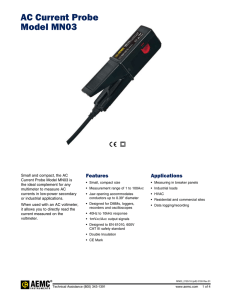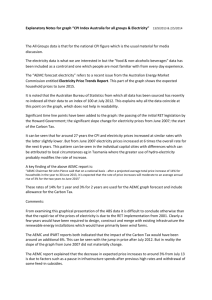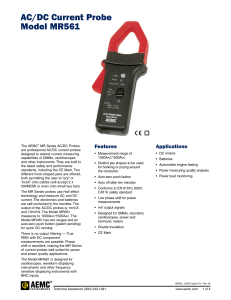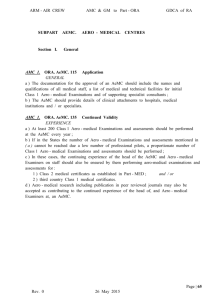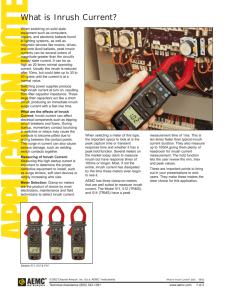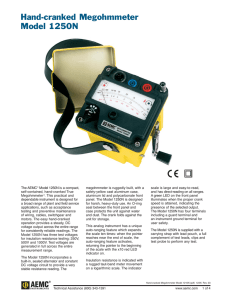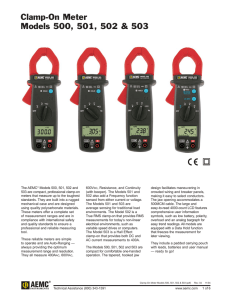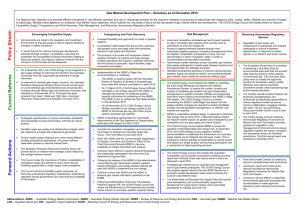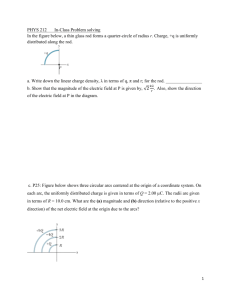Fall-of-Potential Ground Testing
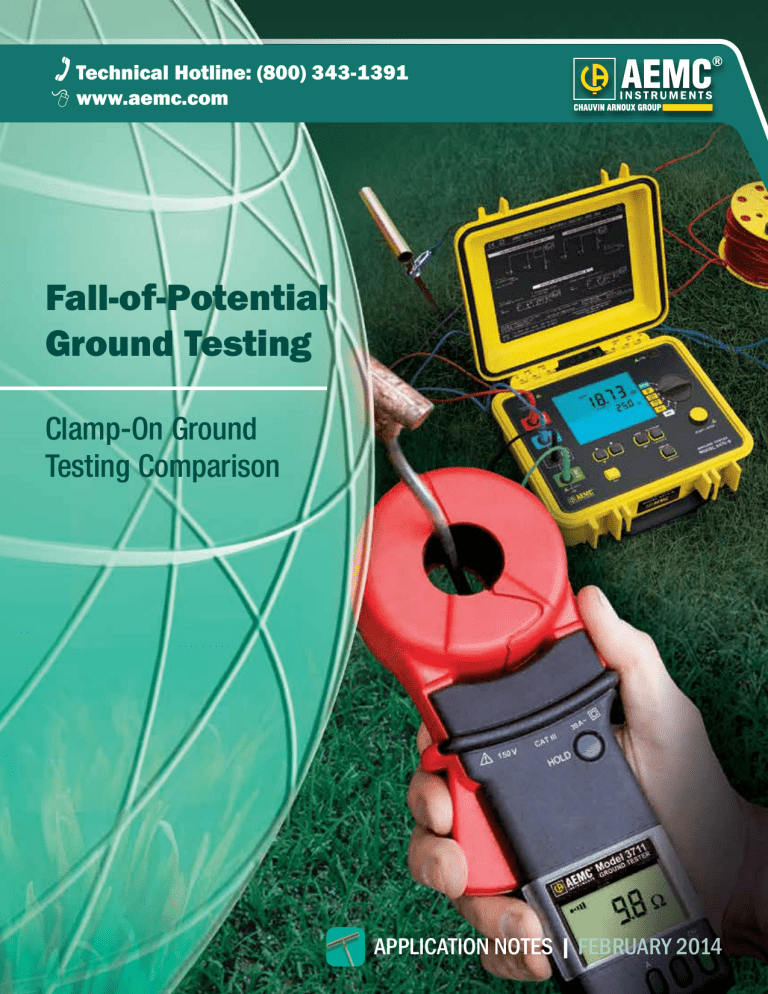
Technical Hotline: (800) 343-1391 www.aemc.com
Fall-of-Potential
Ground Testing
Clamp-On Ground
Testing Comparison
APPLICATION NOTES
|
FEBRUARY 2014
Fall-of-Potential Ground Testing
Clamp-On Ground Testing Comparison
4
10' 5/8"
Diameter
20'
3
10' 5/8"
Diameter
20'
2
On April 14, 2002, a ground resistance test was conducted to compare the results obtained from the Fall-of-Potential 3-Point testing method to the clamp-on testing method. The grounding system consisted of four copper clad rods installed in an approximate 20 ft square. Three of the rods are 5/8 " in diameter and 10 ft in length. The fourth rod is 1/2 " in diameter and 8 ft in length. All rods were coupled together with #3 AWG solid aluminum wire with brass mechanical connections. Figure 1 shows the schematic of the system.
1
10' 5/8"
Diameter
10' 5/8"
Diameter
Figure 1 The Grounding System
The tests were conducted with the following equipment manufactured by AEMC ® Instruments :
Model 6470-B 4-Point Ground Resistance Tester
Model 4630 4-Point Ground Resistance Tester
Model 3731 Clamp-On Ground Resistance Tester
Additionally, we used the AEMC ® Model 6240 , a micro-ohmmeter to verify the bonding of the aluminum wire to the individual ground rods.
The soil conditions in the test area were predominately loam with some gravel.
Conditions on the day of the test were dry and sunny, some light rain had occurred the day previous to the test. Therefore, the soil was somewhat moist at the surface.
The AEMC ® Model 6240 Micro-Ohmmeter was used to measure bonding resistance at each rod and was the first test completed. Measurements from each conductor to the rod were taken as well as measurements from conductor to conductor through the rod and clamp. Readings on rod number three ranged from 615 to 733μ Ω at each bonding point, indicating that all connections were good. See Figure 2 for full results.
Measurement Point
A to B
C to B
A to C
Resistance ( µ Ohms)
713
615
733
Figure 2 Bonding resistance measurements
2 www.aemc.com
Technical Assistance (800) 343-1391
The AEMC ® Model 6470-B was used as 3-Point ground tester. Rod number three was first disconnected from the other rods in the system so that its individual resistance could be measured. The E lead was attached to rod number three
(see Figure 3 ). The H lead was attached to an auxiliary electrode 100 feet away and the S lead was initially connected to the auxiliary electrode 60 feet away. Readings were taken with the S electrode at 90, 80, 70, 60, 50, 40, 30, 20 and 10 feet.
Figure 3 shows the results of this test.
4
20' disconnected
E electrode
3
28'
20'
2
1
S electrode
280'
H electrode
Figure 3 Three-Point test connection
Resistance
79.4
81.7
83.1
83.9
84.3*
84.8*
85.6*
87.3
94.1
100
90
80
70
Ground Resistance
S Rod
10%
20%
30%
40%
50%
60%
70%
80%
90%
*The average of the resistances between 50% and 70% is 84.6
Ω
10% 20% 30% 40% 50% 60% 70% 80% 90%
S rod position as a % to H from E
Figure 4 Model 6470-B test results
Technical Assistance (800) 343-1391 www.aemc.com
3
The same test was repeated using the AEMC ® Model 4630 fall-of-potential ground tester.
The results are shown in Figure 5 .
S Rod
10%
20%
30%
40%
50%
60%
70%
80%
90%
Resistance
71.5
82.3
83.2
83.6
83.7*
84.1*
84.6*
85.3
94.8
100
90
80
70
*The average of the resistances between 50% and 70% is 84.1
Ω
Ground Resistance
10% 20% 30% 40% 50% 60% 70% 80% 90%
S rod position as a % to H from E
Figure 5 Model 4630 test results
Finally, the AEMC ® Model 3731 was used to measure the resistance at rod number three with all other rods detached from it. A temporary cable was installed between rod number three and the municipal grounding system thus setting up the required parallel paths necessary for accurate measurement using a clamp-on ground tester (see Figure 6 ).
Under these conditions, the reading was 84.5
Ω .
The results of these tests showed that the clamp-on ground tester is indeed an effective tool in measuring ground resistance when used under the proper conditions. Readings between the clamp-on ground testing and the fall-of-potential ground testing method correlate. The advantages of using the clamp-on tester were the ability to test without disconnecting the rod from service and the ability to test without the need for auxiliary ground electrodes. These two points saved considerable amount of time in conducting the test.
4
8' 1/2"
Diameter
20'
disconnected
28'
3
1
20'
2
Light Pole
Temporary
Connection
Figure 6 Single rod test using the Model 3731 Clamp-on Ground Resistance Tester
Result Comparison
Model 6470-B 84.6
Ω
Model 4630 84.1
Ω
}
Fall-of-Potential
Model 3731 84.5
Ω Clamp-On
4 www.aemc.com
Technical Assistance (800) 343-1391
We have a solution! Contact us with any technical or product application questions...
United States & Canada
Chauvin Arnoux
®
, Inc. d.b.a. AEMC
®
Instruments
200 Foxborough Blvd.
Foxborough, MA 02035 USA
(508) 698-2115 • Fax (508) 698-2118
Customer Support for placing an order, obtaining price & delivery customerservice@aemc.com
Sales & Marketing Department for general sales and marketing information sales@aemc.com marketing@aemc.com
Repair & Calibration Service for information on repair & calibration, obtaining a user manual repair@aemc.com
United States & Canada (continued)
Technical & Product
Application Support for technical and application support techinfo@aemc.com
Webmaster for information regarding www.aemc.com
webmaster@aemc.com
South America, Central America,
Mexico & the Caribbean
Chauvin Arnoux
®
, Inc. d.b.a. AEMC
®
Instruments
15 Faraday Drive
Dover, NH 03820 USA export@aemc.com
Australia & New Zealand
Chauvin Arnoux
®
, Inc. d.b.a. AEMC
®
Instruments
15 Faraday Drive
Dover, NH 03820 USA international@aemc.com
All other countries
Chauvin Arnoux
®
SCA
190, rue Championnet
75876 Paris Cedex 18, France
Tel 33 1 44 85 45 28
Fax 33 1 46 27 73 89 info@chauvin-arnoux.com www.chauvin-arnoux.com
Call the AEMC ® Instruments Technical Assistance Hotline for immediate consultation with an applications engineer: (800) 343-1391
Chauvin Arnoux ® , Inc. d.b.a AEMC ® Instruments • 200 Foxborough Blvd. • Foxborough, MA 02035 USA • (800) 343-1391 • (508) 698-2115 • Fax (508) 698-2118
Export Department: (978) 526-7667 • Fax (978) 526-7605 • E-mail: export@aemc.com
APP_Ground_ComparisonofTesters_0214Rev04 Printed in the USA
